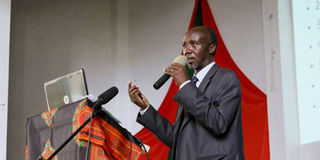Why our agriculture polices need review

Outgoing Egerton University vice-chancellor professor James Tuitoek delivers a valedictory public lecture in Njoro on November 9, 2015. PHOTO | SULEIMAN MBATIAH
What you need to know:
- After being at the helm of the premier agricultural training institution for close to 10 years. We had a chat with him on the status of agricultural training, policies in the sector and the Seeds of Gold magazine.
- By highlighting success stories on young entrepreneurs, we are now seeing more young people making a lot of inquiries on how to start small dairy units while others want to set up horticultural farms.
- The good thing about Seeds of Gold is that our pool of professors, supported by a team of technical experts, provide authentic knowledge that is backed by science and proven research. We are now a reliable knowledge partner to the farming community.
You were part of the team that came up with Seeds of Gold, tell us that story.
Sometime last year, the former Nation Media Group CEO Linus Gitahi visited the university and during our fruitful discussions, we debated on how NMG and Egerton University can partner to develop a platform where topical and relevant issues on agriculture could be given prominence.
As an agricultural university, we agreed we will offer the knowledge and the Seeds of Gold was born. Since then, the seed has germinated into a preferred platform where ideas are exchanged between farmers and experts.
Has the magazine transformed farming?
Certainly, we have been able to push new technologies to the doorsteps of farmers. The research we are doing is now disseminated to farmers and other stakeholders. We have changed the mindset of youths as far as their thinking on agriculture is concerned.
By highlighting success stories on young entrepreneurs, we are now seeing more young people making a lot of inquiries on how to start small dairy units while others want to set up horticultural farms.
The youths have realised that there is money in agriculture. Many have been encouraged to go into farming; they no longer associate it with hard labour.
The good thing about Seeds of Gold is that our pool of professors, supported by a team of technical experts, provide authentic knowledge that is backed by science and proven research. We are now a reliable knowledge partner to the farming community.
Egerton University is reaching millions of farmers, who now get the same information at once. It is like Kenya has an agriculture baraza every Saturday. We will strive to better the magazine so that we can reach all the farmers in various parts of the country.
Have you ever missed a copy of the Seeds of Gold?
It’s a must read, the first thing on Saturday morning. I am interested in reading how our professors and our technical experts are solving farmers’ problems.
Now, to the extension officers. Lack of their interaction with farmers has become a hindrance to boosting food production. What is your take?
We need continuous training of extension officers if we want to make this country food sufficient. Technology is becoming more complex by the day and as a country, we need to invest more in training experts on the emerging technological issues and then dispatch them to work at the grassroots.
As Egerton, we have embarked on a programme to reach out to our past graduates for refresher courses at our new agricultural school, Kenyatta Campus in Njoro. We teach them soft skills so that they remain relevant and useful to the farming community.
What is your collaboration with some of Israeli agricultural firms?
Egerton has partnered with Agro Studies Company of Israel, which has given opportunities to our students to do attachment.
Recently, we received the first batch of the 13 students who spent 11 months at the firm and were exposed to more advanced technology and we hope by the time they graduate next month, they will have a different view in agriculture.
What is your take on the current agriculture policies in Kenya?
A good number of the policies need to be reviewed. The government must make up its mind on whether to subsidise inputs or outputs, but not both as it has been happening. Recently, the Ministry of Agriculture subsidised fertiliser to boost yields and at the same time interfered with the maize prices.
If the government subsidises inputs, then it should let the market be controlled by the forces of supply and demand.
However, if for any strategic reasons we must control the maize prices to make sure our grain reserves are full, we must allow the surplus maize to be subjected to the market forces. The excise duty slapped on sorghum before it was removed was another blunder as it had affected more than 200,000 farmers mostly in dry parts of Kenya such as Kitui and Makueni.
The policy on the dairy sector also needs to be overhauled. The cost of production per litre seems to be escalating and the government must intervene and find a way of reaching a middle ground.
The impression on the ground is that processors are making good money. Most farmers cannot understand how they sell a litre of milk at Sh30 and then buy a litre of yoghurt from the supermarkets at Sh200.
Farmers feel oppressed and, therefore, there is need to review the policy. The prices must be stabilised by studying the value chain to understand the transactions cost such as packaging and power. The government intervention may include removing tax on materials used in making animal feeds.





